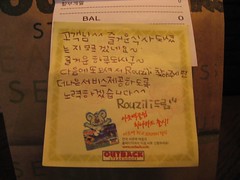 We eventually made it to the new Outback Steakhouse nearby, which had failed to work out for us on its first day of business. One of our Korean friends arrived armed with various vouchers and a loyalty card, and much discussion was once again held over what could be ordered. Sometimes I think it would be easier to negotiate the complete disarmament of North Korea than order food with my friends, but to their credit the staff in Korean restaurants and stores nearly always seem more than ready to enter into considerable protracted discussions with their customers.
We eventually made it to the new Outback Steakhouse nearby, which had failed to work out for us on its first day of business. One of our Korean friends arrived armed with various vouchers and a loyalty card, and much discussion was once again held over what could be ordered. Sometimes I think it would be easier to negotiate the complete disarmament of North Korea than order food with my friends, but to their credit the staff in Korean restaurants and stores nearly always seem more than ready to enter into considerable protracted discussions with their customers.The first time we went into an Outback here, an English language version of the menu was unexpectedly shoved under my nose much to my surprise. This time, my wife immediately asked for one, proving again that once a concession is made it can become an expectation.
What surprised me - aside from the outrageously salty food which left me playing Russian Roulette with my Meniere's Disease - were the particularly large name tags worn by the staff. But it wasn't the name tags themselves, so much as the 'names' of the staff - it appeared they'd chosen English names to identify themselves. While the name tags were smaller, I then recalled that this was also the case in the first Outback I'd visited here. Was this a rule from the Not-Australian (Outback Steakhouse was founded in Florida in 1988 and remains an American company) Corporate Headquarters?
When asked, our waitress told us that the staff had picked the names so that they were easy for the customers to remember. Which struck me as a little odd, given that 99.9% of customers would be Korean and one would think that it might be easier for them to remember Korean names. On the other hand, closer observation revealed that while some staff went under the more conventional nomenclature of Ame and Tina, others had adopted the somewhat more unusual Tweety and Milk, and I certainly didn't forget those in a hurry.
Sometimes I wonder from the amount of talking that goes on when I'm out with Korean friends whether we are, collectively, possibly some of the worst customers in Busan, feared by establishments across the city. Suffice to say I think we complain sometimes and maybe everyone does, but I do wonder if we push things further than most would. Although I say "we", when I really mean "not me" - I'm just a passenger along for the ride. But along with our bill we got a long handwritten post-it note from our waitress expressing the wish that if we came again and looked for her ('Rouzili') then she will do her best to provide even better service. I hope this is just because this branch is new.
Outback is an interesting place, because by relative standards in Busan, it's quite expensive - our bill for three people came to 45,000 won (about £24) for three dishes excluding drinks. This is about the going rate in the UK but the cost of one dish in Outback could often feed three people in some of the Korean restaurants. Despite this, and perhaps predictably, they are almost always full of young people, although it did leave my companions wondering where they get the money from, especially given the fact that some of them were almost certainly from the local university. It feels like despite the evident austerity if not poverty elsewhere, there is clearly an almost yuppy Korean class who gravitate towards this kind of place.
No comments:
Post a Comment